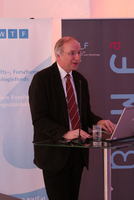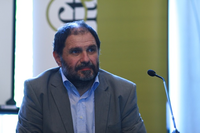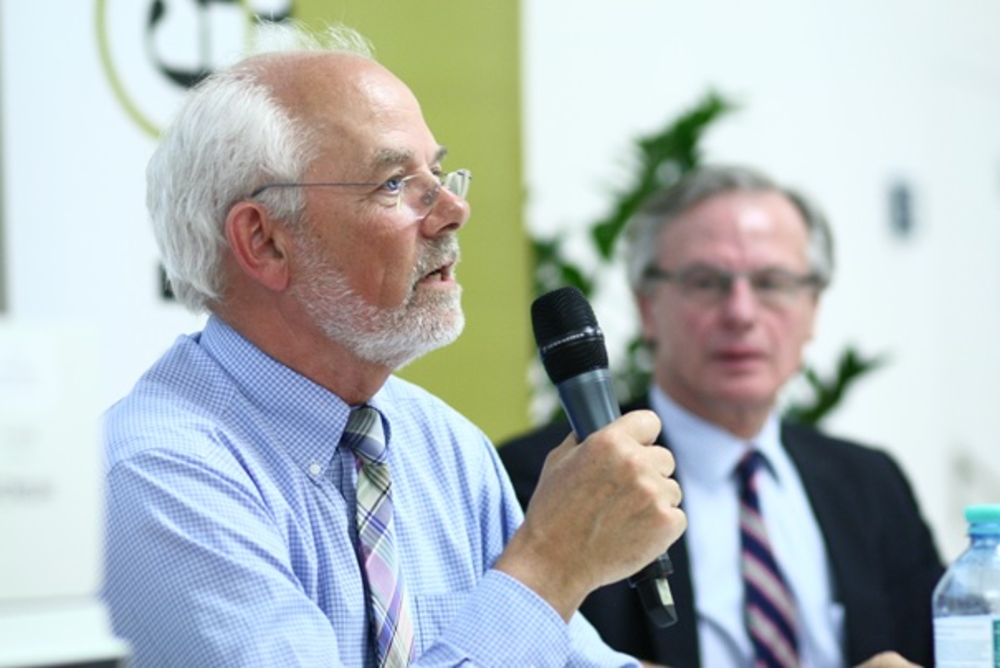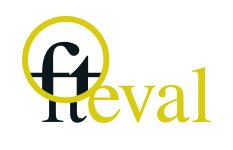-

“Auf dem Weg zur Kultur der Kreativität. Neue Herausforderungen für das deutsche Wissenschaftssystem”
16. Februar 2011, Aula der Wissenschaften Vortrag: Wilhelm Krull Die Plattform Forschungs- und Technologieevaluierung begann im Herbst 2010 in Kooperation mit dem Bundesministerium für Wissenschaft und Forschung und dem Wiener Wissenschafts-, Forschungs- und Technologiefonds eine Serie von Veranstaltungen, die das österreichische Forschungssystem mit jenen anderer Länder vergleicht. Bei unserer kommenden Veranstaltung widmen wir uns der Forschungslandschaft beziehungsweise dem Wissenschaftssystem Deutschlands. In einer sich dynamisch verändernden, immer komplexer werdenden Welt stehen auch Wissenschaft, Forschung und Technologie vor vielfältigen neuen Herausforderungen. Dabei besteht weltweit ein Konsens, dass die künftigen Wachstumschancen und die soziale Sicherung der jeweiligen Gesellschaft in immer höherem Maße auf einer [...]
-

“French research and innovation policy in the 2000s: sweeping changes?”
6. Juni 2011, Palais Glam Callas Vortrag: Philippe Laredo Downloads: Präsentation Philippe Laredo [PDF, 1.0 MB]
-
FIRST KEY NOTE SPEECH
The Politics and Policies of Evaluation in a Multi-level Research System, Wilhelm KRULL (Volkswagenstiftung) Downloads: Wilhelm_Krull_First_key_note [PDF, 2.49 MB]
-
SESSION 1 – NEW APPROACHES FOR EVALUATING STI POLICIES AND INSTRUMENTS
New approaches for evaluating STI policies and instruments Presentations: Matthias WEBER, AIT and Wolfgang POLT, Joanneum Research: Assessing mission-orientated R&D programs: combining foresight and evaluation Pierre-Benoit JOLY, Institut Francilien Recherche Innovation Société (IFRIS) and INRA/SenS, Ariane GAUNAND, Grenoble Applied Economics Lab (GAEL), Philippe LAREDO, IFRIS, Mireille MATT, GAEL and Stéphane LEMAIRE, IFRIS: Designing and implementing a new approach for the ex-post assessment of impact of research – a return of experience from the ASIRPA project Stephanie DAIMER, Fraunhofer Institute for Systems and Innovation Research: Evaluating the novel German “VIP” measure – addressing the stage of translational research between basic research and [...]
-
SESSION 1 – New approaches for evaluating STI policies and instruments
New approaches for evaluating STI policies and instruments Presentations: Matthias WEBER, AIT and Wolfgang POLT, Joanneum Research: Assessing mission-orientated R&D programs: combining foresight and evaluation Pierre-Benoit JOLY, Institut Francilien Recherche Innovation Société (IFRIS) and INRA/SenS, Ariane GAUNAND, Grenoble Applied Economics Lab (GAEL), Philippe LAREDO, IFRIS, Mireille MATT, GAEL and Stéphane LEMAIRE, IFRIS: Designing and implementing a new approach for the ex-post assessment of impact of research – a return of experience from the ASIRPA project Stephanie DAIMER, Fraunhofer Institute for Systems and Innovation Research: Evaluating the novel German “VIP” measure – addressing the stage of translational research between basic research and [...]
-
SESSION 4a – Challenges in assessing new European Research Area polices, programmes and instruments
Challenges in assessing new European Research Area polices, programmes and instruments Presentations: Emanuela REALE, CERIS CNR Institute for research on firm and growth, Maria NEDEVA and Thomas DUNCAN, University of Manchester/ Manchester Institute of Innovation Research, Emilia PRIMERI, CERIS CNR: Assessing the impact of joint and open research programmes: a process-centred approach Martin-Felix GAJDUSEK, ZSI – Centre for Social Innovation and Nikos SIDIROPOULOS, University of Athens, Centre of Financial Studies: Monitoring and Evaluation in joint calls of “horizontal – INCO” ERA-NET and ERA-NET PLUS actions Martin MAREK and Erich PREM, eutema Technology Management GmbH & Co KG: Visualizing programme participations with [...]
-
SESSION 4b – Challenges in assessing new European Research Area polices, programmes and instruments
Challenges in assessing new European Research Area polices, programmes and instruments Presentations: André MARTINUZZI and Markus HAMETNER, Vienna University of Economics and Business, Research Institute for Managing Sustainability (RIMAS): The FP7-4-SD.eu monitoring system – how does the 7th EU Framework Programme contribute to Sustainable Development? Nathalie HUBER and Antje WEGNER, Institute for Research Information and Quality Assurance: How funding of “excellent” young researchers may contribute to the European Research Area – Reflections on empirical results obtained from evaluating the “Starting Grants” program Susana Elena PEREZ, Elisabetta MARINELLI, Institute for Prospective Technological Studies, Joint Research Centre, European Commission, Ana FERNANDES-ZUBIETA, Institute for Advanced [...]
-
SESSION 5 – Evaluating for selection – challenges and opportunities
Evaluating for selection – challenges and opportunities Presentations: Ina DREJER and Poul-H. ANDERSEN, Aalborg University: Is the tail wagging the dog? An analysis of possible isomorphism effects in innovation project applications Peter BIEGELBAUER and Thomas PALFINGER, AIT – Austrian Institute of Technology: Selecting Innovation: Project Selection Procedures in Research Funding Agencies Susanne BÜHRER, Fraunhofer Institute for Systems and Innovation Research: New modes of stakeholder involvement in ex ante impact assessments Downloads: Selecting Innovation: Project Selection Procedures in Research Funding Agencies [PDF, 352.75 KB] New modes of stakeholder involvement in ex ante impact assessments [PDF, 577.71 KB] Is the tail wagging the [...]
-
SESSION 6 – Evaluation practices scrutinised
Evaluation practices scrutinised Presentations: Erich PREM, eutema Technology Management GmbH & Co KG: Evaluation as the construction of policy narratives Jürgen STREICHER, Vienna University of Economics and Business: The Influence of Evaluations on STI Policy Making Franz BARJAK, University of Applied Sciences and Arts Northwestern Switzerland FHNW: Supporting policy learning by means of an evaluation synthesis: findings from a study on Swiss innovation policies Wolfgang POLT, Joanneum Research, Kaisa LÄJTEEMÄKI-SMITH and Kimmo HALME, Ramboll Management Consulting: How to evaluate large-scale ‘transformative’ STI funding programmes Downloads: Supporting policy learning by means of an evaluation synthesis: findings from a study on Swiss innovation [...]
-
SESSION 7 – Evaluation of STI policy portfolios and policy mixes
Evaluation of STI policy portfolios and policy mixes Presentations: Peter Van den BESSELAAR, VU University Amsterdam Network Institute & Department of Organization Studies and Ulf SANDSTRÖM, Royal Institute of Technology - KTH: Evaluation at the research systems level: Funding ecologies as policy portfolio Christiane KERLEN, Dr Kerlen Evaluation, Christian Von DRACHENFELS, Leo WANGLER and Jan WESSELS, Institut für Innovation und Technik, Volker WIEDMER, Hochschule Magdeburg-Stendal: Portfolio evaluations: A case study to illustrate evaluation challenges Ly LOOGA, Tallinn University of Technology, Ragnar Nurkse School of Innovation and Governance: How STI policy instruments affect science and business cooperation in the Estonian ICT sector? [...]
-
SESSION 8 – Data, monitoring systems and indicators
Data, monitoring systems and indicators Presentations: E. Brooks APPLEGATE, Western Michigan University: Management and Aggregation of Disparate Data from Disparate Sources: Illustrations from an Evaluation of the Swiss National Science Foundation Michael DINGES, AIT – Austrian Institute of Technology, Jakob EDLER, University of Manchester - Manchester Institute of Innovation Research and Matthias, WEBER, AIT: Measures and means to position competence centres via monitoring data: evidence from the Austrian Competence Centre Programmes Kplus and K_Ind/K_net Matteo RAZZANELLI, Science Europe: Data availability for STI policy portfolio evaluations: a process-related challenge requiring new models for stakeholder engagement Torger MÖLLER, Marion SCHMIDT and Daniel SIRTES, [...]
-

Dänemark – ein herausragender Forschungsstandort
10. Juni 2013, bmwf Veranstaltungsräumlichkeiten Freyung Vortrag: Lauritz Holm-Nielsen Dänemark gehört zu den europäischen Spitzenländern in Forschung und Innovation. Ähnlich wie in der Schweiz oder in den Niederlanden gelingt es dort, herausragende Positionen zu erreichen, wenn es um Outputs, Impacts und Dynamiken von Forschungsfeldern geht. Zugleich hat Dänemark eine tiefgreifende Reform des öffentlichen Forschungssektors hinter sich, die eine Stärkung der großen Universitäten zur Folge hat. In der Veranstaltung geht es darum, Faktoren zu identifizieren, die diese erfolgreiche Entwicklung ermöglicht haben und weiter verstärken. Programm: 13:00 Begrüßung: SC Mag.a Barbara Weitgruber (BMWF) 13:15 Vortrag Prof. Lauritz Holm-Nielsen 14:00 Discussant: Prof. Georg Winckler [...]
12 events found.

